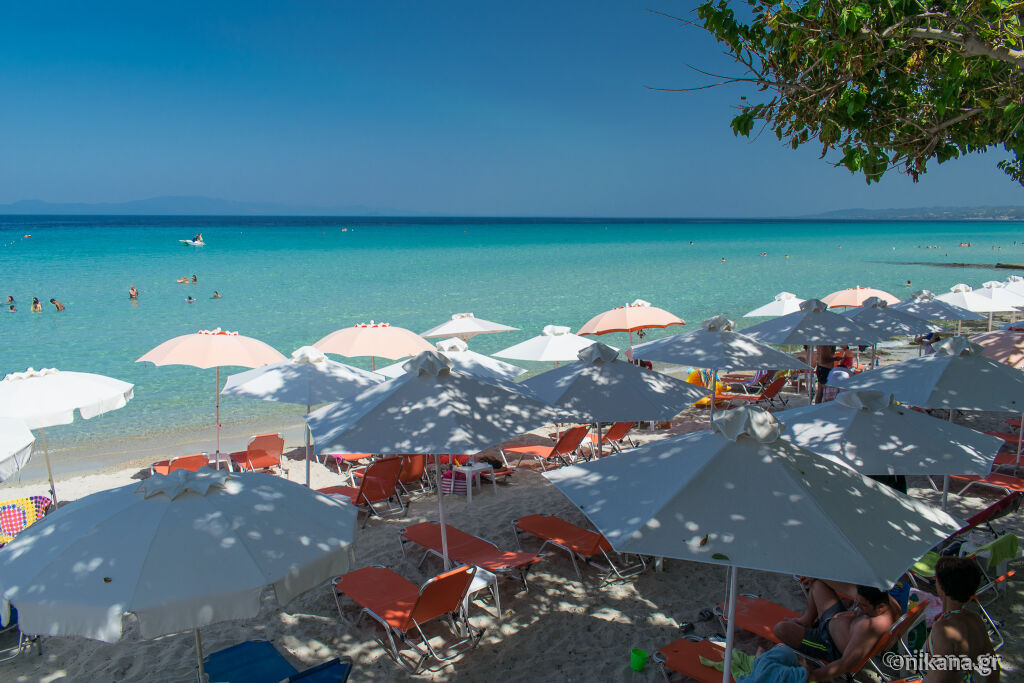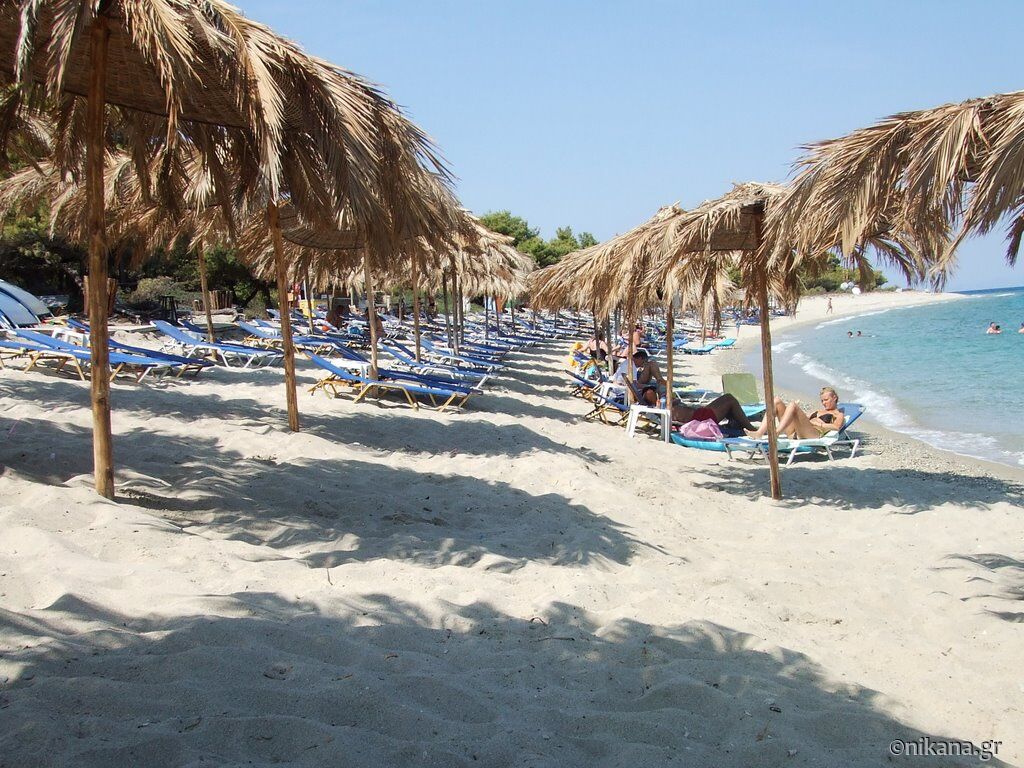Can a beach in Greece be private?
In Greece, the coastal areas and beaches are a precious public asset that belongs to the state. According to Greek law, bars and hotels are allowed to use up to a maximum of 50% of the beach for setting up umbrellas and sun loungers, but as we all know, this is often not the case. Many beaches are completely covered with umbrellas, and on some of them, entrance is only allowed with payment, minimum consumption, or mandatory rental of umbrellas and sun loungers.
Who do the beaches in Greece belong to?
Have the Greeks decided to control the enforcement of the law that designates the Greek coastline as a public asset? It seems that they have. How this will be implemented remains to be seen, but this is definitely a good step.
The Deputy Prosecutor of the Supreme Court, Panagiotis Panagiotopoulos, has called on prosecutors throughout the country to prioritize the preservation of unhindered access to beaches. In a letter sent to all prosecutors in the country, he emphasizes that in Greece, there are no private beaches and it is the duty of prosecutors to stop those who restrict the free access of citizens to the coastline. “The Greek coastline is considered ‘common property’ and should serve the public interest, and protecting the coastline is our duty,” the prosecutor emphasizes in the letter, regarding the issue as “pressing.”
The letter calls on all prosecutors to show strictness in cases of beach appropriation by bars and hotels.
What does the law say about beaches?
“The law does not recognize private beaches, and if there are any unlawfully claimed areas within your jurisdiction, due to years of indifference by the authorities and lack of any control, we must use prosecutorial procedures to restore things to their previous state. If necessary, you must make use of measures of procedural enforcement (misdemeanor and criminal charges, confiscation of all items and objects related to the criminal charges, immediate demolition), and the like.”
The Law on the Lease of Beaches and Coasts in Greece contains provisions that are intended to regulate this situation. Some of the key regulations are:
-A coastline less than 6 meters long cannot be leased.
-For the placement of sun loungers and umbrellas, the leased area must not exceed 500 m². If there are multiple lessees on the same beach, there must be a free zone of at least 100 meters between them.
-No more than 50% of the total beach area can be covered with sun loungers and umbrellas.
-A maximum of 50% of the leased space can be covered with sun loungers and umbrellas to allow bathers freedom of movement. There must be a free zone of at least 1 meter between rows of sun loungers.
-The access strip between the sea and the first row of sun loungers must be free, with a width of at least 5 meters, to ensure the safe movement of bathers.
-The music on the beach must not be too loud - the permitted sound level is up to 50 dB.
-Natural and environmentally friendly materials are used for sun loungers and umbrellas to protect the environment.
-The local authorities are responsible for regularly cleaning the beaches and installing modern garbage cans to maintain the cleanliness and aesthetics of the coast and the surrounding area.
Increasing crowds with sun loungers. How to find a vacant spot for a towel?
Many cases have become well known in recent years, especially in highly touristy areas with large hotel complexes in Crete, Rhodes, Halkidiki, and Skiathos. The constitutional right to free access to the beach and the coast is protected, and the rules for the use of beaches are described in the law, but there are loopholes in the law that allow for the occupation of entire beaches “legally.” The authorities are aware of this problem and are trying to solve it.
Incidentally, local residents are particularly upset about hotels and beach bars usurping the beaches. Some beaches that were freely accessible for decades, where people grew up, now have ramps and can only be accessed if an entrance fee or fees for sun loungers and umbrellas are paid.
In the past years, Greeks have been filing numerous reports against hotels and beach bars that restrict access to the beaches, and this notification from the Supreme Court prosecutor is encouraging for all beach visitors not to accept extortion and to report violations of the law.
Many well-known beaches in Halkidiki and Thassos are almost completely covered with sun loungers, and access to some of them is practically closed.
During the 2023 season, a protest called “Freedom for Towels” began on one island and spread incredibly quickly to a large number of beaches throughout Greece. Thanks to the protest, bars on some beaches started to comply with legal regulations, and where they did not, the owners were fined and some were even arrested.
You can view the law on the official website here.
What is your experience?
Our website nikana.gr is the leading source of information about Greece in Serbia and beyond.
Follow us on our social media platforms and stay up to date with everything you’re interested in about Greece!
Facebook: Nikana.gr
Instagram: @nikana.gr
Tiktok: nikana.gr
Facebook group: Live from Greece
Write to us via email: nikana@nikana.gr
9 comments
Post a Comment
NOTE
All your questions in the comments will receive an answer via email so check your inbox shortly after you posted comment. For more detailed questions and responses, contact us via mail nikana@nikana.gr.









Louis Siebert08.09.2025 07:50:28
Small Banana Beach in Skiathos has been a naturist beach since 1983. I have been visiting the Island for the past 28 years without encountering any problems. Four years ago a boat rental licence was granted to George Boat Rental and since then he has been restricting naturists from walking on the beach in front if his business. This year the management of the Elivi Hotel is doing the same - naturists are restricted from walking in the area between the sea and their sunbeds. They are claiming that they bought the beach and can therefore make the rules. Skiathos has lost a lot of regular visitors this year because of the arrogant and aggressive attitude of the owner of George Boat Rental and the management of the Elivi Hotel.
Ari Papadopoulos 26.06.2025 16:26:04
For all the kind people who wrote their comments above, we kindly remind you that in this page WE WRITE IN ENGLISH. We could write up in Greek language, but as we want to be inclusive, we created this page IN ENGLISH, so be so kind and abide. Thank you, hvala
Karsten20.09.2024 11:03:06
What about private people renting land from Greece like the Russian rented island Scorpio in the Ionian sea? They put up sign to prohibit access, anchoring etc?
Nebojša03.09.2024 12:05:21
Pozdrav, Letnjem u Polihronu i zanima me na koji mejl se mogu prijaviti vlasnici ležaljki i suncobrana za iznajmljivanje? Dozvoljenih 50% zauzetosti plaže sa ležaljkama se uopšte ne poštuje.
Boban16.08.2024 15:55:36
Plaza KLIMARIJA na Sitoniji ne poštuje propise treba ih prijaviti. Hvala.
Biljana01.07.2024 21:04:14
Trenutno letujem u Polihronu, Od zakona nema nista ležaljke su toliko gusto naslagane da ne moze da se prodje a turiste sa sopstvenom opremom samo sto ne proteraju. Izmedju dva bara ne moze da se mimiidju dva coveka koliko su blizu.... Kome da se prijave ove nepravilnosti, gužva je užasna, konobari bezobrazni i radteruju ljude sa sopstvenom opremom koja se nalazi ispod lezalhki Pozdrav
Vesna Petkovic01.07.2023 12:25:47
Na plaži u Pefkariju postavili smo suncobran na praznom prostoru između dva Beach bara, bliže Akti baru. Došla je devojka iz bara Akti i tražila da se sklonimo pošto oni plaćaju plažu 3000 Eur. To nam je rekla kada smo mi rekli da je tu slobodno. Ne znam da li su lokalne vlasti svesne ovih situacija gde teraju turiste i što se mene tiče Tasos ću ubuduće izbegavati u širokom luku.